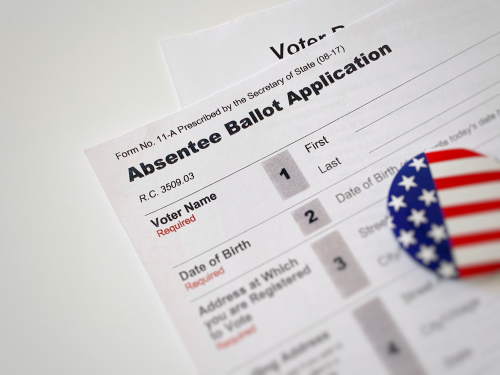Tennessee can continue ban on absentee ballot distribution, 6th Circuit says

The 6th U.S. Circuit Court of Appeals at Cincinnati has held that a Tennessee law that dates back to 1979 qualifies as conduct, rather than speech. Image from Shutterstock.
A split federal appeals court last week rejected a free speech challenge to a Tennessee law that limits the distribution of absentee ballot applications.
In its Oct. 5 decision, the 6th U.S. Circuit Court of Appeals at Cincinnati held that the law—which since 1979 has made it a felony for anyone other than an election official to hand out the state’s form for applying to vote absentee—qualifies as conduct, rather than speech, Law.com reports.
The appeals court also disagreed with the plaintiffs’ arguments that because they wanted to distribute the application form while expressing political messages, Tennessee’s law should be subject to strict scrutiny or the Anderson-Burdick balancing test that may apply to election challenges.
“Admittedly, the First Amendment provides some protection to ‘expressive conduct,’” said Judge Eric Murphy, writing for the majority. “But strict scrutiny does not apply to Tennessee’s ban because it neutrally applies no matter the message that a person seeks to convey and because it burdens nobody’s ability to engage in actual speech.”
“We have also never extended Anderson-Burdick’s balancing test to this sort of speech claim,” Murphy added.
According to his opinion, the test requires courts to balance an election law’s burden on voters against the state’s interests in the law.
The Memphis and West Tennessee AFL-CIO Central Labor Council and five other plaintiffs brought the lawsuit ahead of the 2020 election, claiming that they could register more absentee voters if they could give them an actual application form, rather than direct them to the state’s website. They alleged that Tennessee’s distribution ban violated their freedom of speech by limiting their “core political speech and expressive conduct” and freedom of association by restricting their advocacy efforts.
A district court dismissed their complaint in 2021. According to its decision, the ban does not cover “expressive” conduct protected by the First Amendment, and even if it did, it would not trigger strict scrutiny. as it did not limit their political speech.
Murphy said even if the plaintiffs offered sound policy arguments for reconsidering Tennessee’s law, the appeals court’s role “is not to decide whether the ban represents good or bad policy.” That, he wrote, is up to the state’s legislature.
In a dissent, Judge Helene White argued that Tennessee’s law should be subject to the “exacting scrutiny” that the U.S. Supreme Court has applied to restrictions on petitions, pamphlets and other political documents.
“Like these protected activities, distributing absentee-ballot applications necessarily involves ‘core political speech,’” White wrote.



